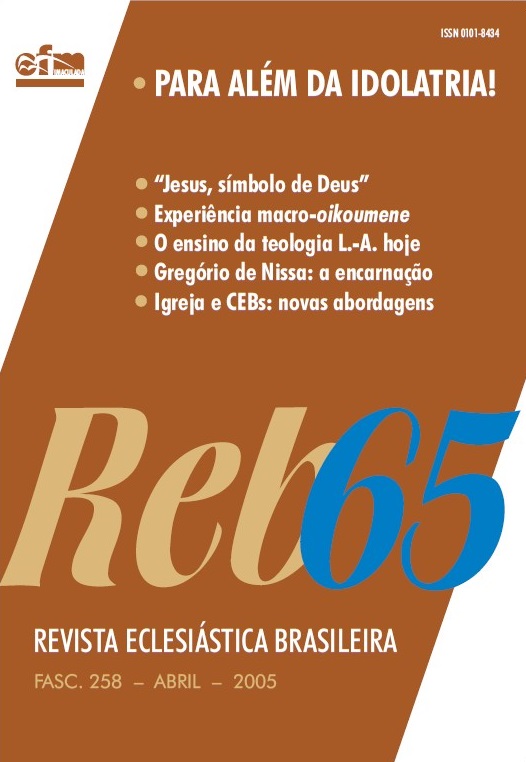Uma cristologia provocada pelo pluralismo religioso. Reflexões em torno ao livro Jesus, símbolo de Deus, de Roger Haight
DOI:
https://doi.org/10.29386/reb.v65i258.1654Palavras-chave:
Cristologia, Pluralismo Religioso, Roger Haight.Resumo
O tema da teologia cristã do pluralismo religioso vem sendo objeto de muitas discussões nos últimos anos, o que manifesta a riqueza de um espaço plural que é essencial para a reflexão teológica. Ocorre que a partir da segunda metade dos anos 90 alguns destes teólogos têm sido objeto de investigação crítica da Congregação para a Doutrina da Fé (CDF). É o caso de Roger Haight, cujo livro, Jesus, símbolo de Deus (1999) foi notificado pela CDF em dezembro de 2004, e qualificado como tendo “graves erros doutrinais contra a fé divina e católica da Igreja”. O objetivo deste artigo é apresentar os tópicos fundamentais do livro de Roger Haight e a sua hipótese de uma cristologia aberta para o pluralismo e o diálogo inter-religioso.
Abstract: Religious pluralism, a theme of the Christian theology, has been the object of much discussion in the past years. This shows the existence of a significant plural space for debates that is essential for the theological reflection. However, since the second half of the 90s, some of these theologists have been subject to a critical investigation by the Congregation for the Doctrine of Faith (CDF). This is the case of Roger Haight, whose book, Jesus, symbol of God (1999) received the CBF’s notification in December 2004, and was said to have “serious doctrinal errors against the Church’s divine and catholic faith”. The objective of this article is to introduce the basic topics of Roger Haight’s book and his hypothesis of a Christology that is open to pluralism and to the inter-religious dialogue.
Downloads
Downloads
Publicado
Como Citar
Edição
Seção
Licença
Copyright (c) 2019 Revista Eclesiástica Brasileira

Este trabalho está licenciado sob uma licença Creative Commons Attribution 4.0 International License.
Os autores cedem os direitos autorais; como gratificação, a REB oferece dois exemplares ao Autor de um artigo.
A REB adere à licença não comercial (Creative Commons). Portanto, é permitida cópia, distribuição e exibição dos textos, respeitados os direitos autorais e citada a fonte de sua proveniência.


